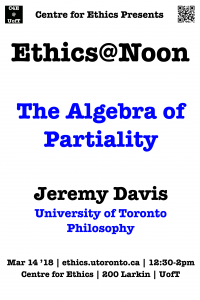 The Algebra of Partiality
The Algebra of Partiality
Most people agree that we are permitted to do more for those with whom we stand in certain special relationships, subject to several constraints. But most also agree that the presence of partiality does not eliminate our more general moral reasons to others. In some cases, however, these two sets of reasons must be compared; thus, we need to know how these two sets of reasons weigh against each other. But just how much extra weight can partiality justify?
Much has been written on the question of whether or not our reasons of partiality may override certain of our positive duties of beneficence to others—for example, our duties to provide aid and famine relief to the global poor. While there is disagreement about the grounds and the extent of such partiality, many philosophers believe that we may indeed give some preference to our co-nationals over outsiders. By contrast, very little has been said concerning the question of how to weigh our various duties of partiality against our negative duties of non-maleficence to outsiders—in particular, our duties to avoid harming or killing them. While the issue of beneficence arises most naturally in discussions of global justice, the question of our duties of non-maleficence is especially pressing in the context of war, which generally involves risking, harming, or killing many innocent people, some of whom are our co-nationals, but many of whom are not. Whereas many philosophers accept that our duties to our co-nationals may in some cases outweigh our duties of beneficence to outsiders, very few philosophers accept that we may prefer our co-nationals when it comes to duties of non-maleficence to outsiders.
My goal in this talk is to illustrate—literally and figuratively—how can sometimes justify overriding certain otherwise weighty negative duties to those with whom we share no special relationship in order to satisfy duties, both positive and negative, that we have towards those with whom we do share such a special relationship. As I will argue, this conclusion follows from endorsing certain plausible assumptions about the relative base weights of various duties, as well as what I will show to be the most plausible account for how to determine the added weight that partiality affords.
Jeremy Davis
Centre for Ethics & Department of Philosophy
University of Toronto
Wed, Mar 14, 2018
12:30 PM - 02:00 PM
Centre for Ethics, University of Toronto
Rm 200, Larkin Building
